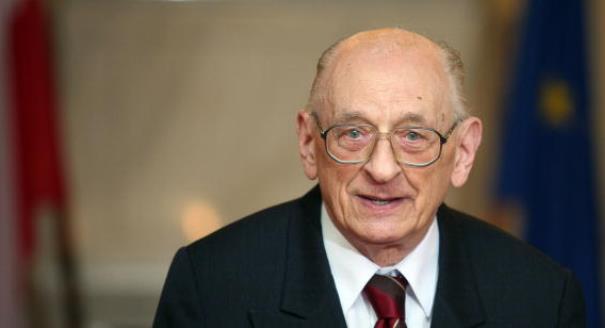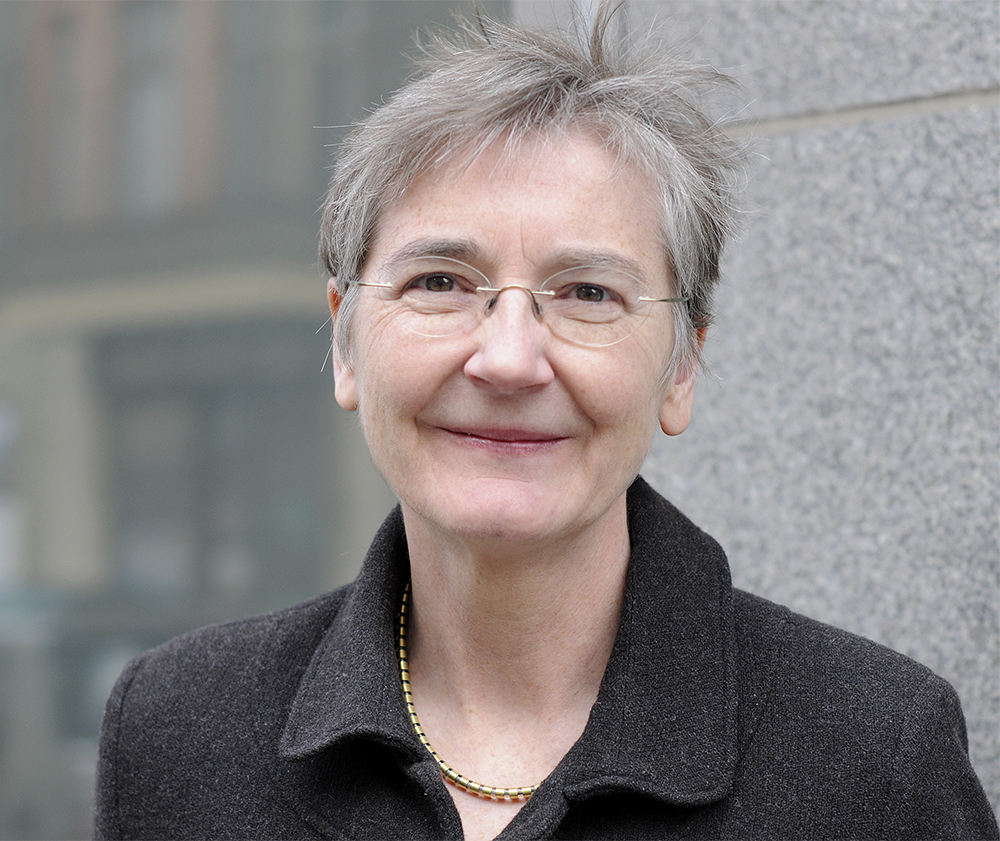Judy Dempsey
{
"authors": [
"Judy Dempsey"
],
"type": "commentary",
"blog": "Strategic Europe",
"centerAffiliationAll": "",
"centers": [
"Carnegie Endowment for International Peace",
"Carnegie Europe"
],
"collections": [
"Europe’s Eastern Neighborhood"
],
"englishNewsletterAll": "",
"nonEnglishNewsletterAll": "",
"primaryCenter": "Carnegie Europe",
"programAffiliation": "",
"programs": [],
"projects": [],
"regions": [
"Europe",
"Eastern Europe"
],
"topics": [
"Security"
]
}
Source: Getty
Death of a Statesman: Władysław Bartoszewski
Wladyslaw Bartoszewski, an indefatigable Polish historian, diplomat, and Auschwitz survivor, died on April 24 after spending his life seeking reconciliation with Germany and Israel.
He was busy up to the day of his death on April 24. As state secretary for international dialogue in Polish Prime Minister Ewa Kopacz’s chancellery and in the previous chancellery, Władysław Bartoszewski was preparing for German-Polish government consultations.
These consultations are probably the crowning achievement of the German-Polish relationship. Led by German Chancellor Angela Merkel, who travels with a team of cabinet ministers to Warsaw on April 27, they are designed to further strengthen a relationship that even Bartoszewski himself would once not have thought possible.
Merkel went along with the appointment of former Polish prime minister Donald Tusk as president of the European Council, which brings together the EU’s 28 heads of state and government. And after forging a very close friendship with Tusk, Merkel has wasted no time in reaching out to Kopacz, his successor.
But the close bonds between Berlin and Warsaw long predate Merkel. They go back to 1965, in the form of a letter written by the then primate of Poland, Cardinal Stefan Wyszyński, and Archbishop Bolesław Kominek: the “Polish Bishops’ Appeal to Their German Colleagues.”
It’s a very special letter, not only because it defied Poland’s ruling Communists, who were fiercely anti-German. It is also significant because the bishops, in Christian tradition, forgave and asked for forgiveness. They appealed for reconciliation, offering forgiveness for the German occupation and asking for forgiveness for forcing millions of Germans out of Poland after 1945.
While the response by the German bishops was cautious, over the years German politicians, notably the former Social Democratic chancellor Willy Brandt, worked hard to improve relations, notwithstanding Communist opposition.
Bartoszewski himself wasn’t free to pursue his real goal of fostering reconciliation between Poland and Germany, and between Poland and Israel, until the Communist regime imploded in 1989. Not that Communism stopped him from calling for dialogue. His past was his guide to the future.
He was brought up in the city of Łódź in a multicultural milieu. His mother, a devout Catholic, encouraged him to defend his Jewish neighbors in the face of anti-Semitism. As a teenager, he joined the Polish resistance against the Nazis and helped persecuted Jews. In late 1940, following a German police raid against Polish intellectuals, he was sent to the Auschwitz concentration camp, from where he was released in 1941.
The postwar years brought little respite. The Communists imprisoned Bartoszewski for seven years until 1955, when he was rehabilitated. He later taught at the Catholic University of Lublin and, at the first opportunity, joined the Solidarity trade union movement, which was founded in 1980. During the imposition of martial law in December 1981, Bartoszewski was imprisoned.
Once Poland emerged from Communism, Bartoszewski, a fluent German speaker, went into overdrive. He was appointed ambassador to Austria and in 1995 and between 2000 and 2001, served as Poland’s foreign minister. Not that diplomatic niceties were his guide.
In 1995, he had been invited to give a speech to the German Bundestag to mark the fiftieth anniversary of the outbreak of World War Two. Bartoszewski spoke with passion and sorrow about the Holocaust and the crimes committed by the Germans against the Poles but also about the forced resettlement and expulsion of the Germans from Poland. The speech won him praise in Germany but also some criticism back home.
Yet Bartoszewski was staunchly opposed to the Center Against Expulsions, a planned German documentation center in Berlin for expulsions and ethnic cleansing. He also had little time for Erika Steinbach, president of the Federation of Expellees, the German nonprofit organization that initiated the project. Steinbach had long fought, in vain, to set up the center.
Looking back over the growing German-Polish rapprochement, Bartoszewski remarked: “If someone had told me in 1941, while I was standing on the parade ground in Auschwitz, that I would have German friends one day, I would have called him mad.”
Coincidentally, as Germany celebrates sixty years of diplomatic relations with Israel, during that time Bartoszewski was instrumental in paving the way for reconciliation between Poland and Israel.
During World War Two, while serving in the Polish Home Army, Bartoszewski co-founded Żegota, the Council to Aid Jews. “Someone should do it? Someone should react? Someone should oppose? Someone should protest? I asked myself these questions and I found the answer. If someone, then why not me?” he said in an interview.
As a member of Żegota, he rescued Jews living in the Warsaw ghetto from being sent to the death camps and, over the years, worked for the welfare of a dwindling community.
On April 19, just a few days before his death, Bartoszewski attended a ceremony to mark the seventy-second anniversary of the beginning of the Warsaw Ghetto Uprising. “I remember those terrible days of uncertainty. Those attempts to give these people a hand. My help could mainly consist in facilitating escape from the ghetto while there were young people who wanted to fight, not escape,” he said in an interview.
When his death was announced on April 24, the tributes began to flow in. But it was perhaps one of Bartoszewski’s most memorable quotations that was repeated throughout that evening: “It’s worth being honest, although it doesn’t always pay off. It pays off to be dishonest, but it isn’t worth it.”
About the Author

Nonresident Senior Fellow, Carnegie Europe
Dempsey is a nonresident senior fellow at Carnegie Europe
- Europe Needs to Hear What America is SayingCommentary
- Babiš’s Victory in Czechia Is Not a Turning Point for European PopulistsCommentary
Judy Dempsey
Recent Work
Carnegie does not take institutional positions on public policy issues; the views represented herein are those of the author(s) and do not necessarily reflect the views of Carnegie, its staff, or its trustees.
More Work from Strategic Europe
- Europe on Iran: Gone with the WindCommentary
Europe’s reaction to the war in Iran has been disunited and meek, a far cry from its previously leading role in diplomacy with Tehran. To avoid being condemned to the sidelines while escalation continues, Brussels needs to stand up for international law.
Pierre Vimont
- Taking the Pulse: Can European Defense Survive the Death of FCAS?Commentary
France and Germany’s failure to agree on the Future Combat Air System (FCAS) raises questions about European defense. Amid industrial rivalries and competing strategic cultures, what does the future of European military industrial projects look like?
Rym Momtaz, ed.
- Macron Makes France a Great Middle PowerCommentary
France has stopped clinging to notions of being a great power and is embracing the middle power moment. But Emmanuel Macron has his work cut out if he is to secure his country’s global standing before his term in office ends.
Rym Momtaz
- How Europe Can Survive the AI Labor TransitionCommentary
Integrating AI into the workplace will increase job insecurity, fundamentally reshaping labor markets. To anticipate and manage this transition, the EU must build public trust, provide training infrastructures, and establish social protections.
Amanda Coakley
- Can Europe Still Matter in Syria?Commentary
Europe’s interests in Syria extend beyond migration management, yet the EU trails behind other players in the country’s post-Assad reconstruction. To boost its influence in Damascus, the union must upgrade its commitment to ensuring regional stability.
Bianka Speidl, Hanga Horváth-Sántha










